Based in Enniscorthy, Co Wexford, Trevor Ashmore’s Belgian Blue herd has made a name for itself over the last number of years.
The relatively young herd has made it to the top table in pedigree breeding, selling nine bulls to AI services in Ireland and abroad.
However, after 25 years, the herd will disperse on Wednesday 18 October at Carnew Mart.
Trevor said: “We were always malting barley here alongside the Blues, but the cereal market has been quite depressed and with the three-crop rule, we had to pull in other grains.
“We’re growing wheat, oats and maize now and selling the cereals off the field green.
"The sector’s been quite depressed of late and we can grow the grain and straw, which means we can grow the feed ourselves. Basically, I’m trying to add value to it so we’re going to try fattening cattle off it.”
Of course, you build up knowledge of stock and knowledge of breeding and try to combine both
This change of enterprise means some of the better-known lines which have produced numerous champions and AI bulls will be offered at the sale.
Trevor explains how the herd was started: “I started back in 1992 with the help of my parents, Niall and Joyce.
Originally, female lines would have come from Ireland, but we went to Belgium in 1999 and imported basically my two brood cows really. Most of the herd would have stemmed from that.
“They were called Atlanta and Jocvel.
"We slowly grew it within ourselves, then didn’t buy in that much. They became our two breeding cows. We flushed them and they were two serious breeding cows and those lines filtered through to the sale animals also.
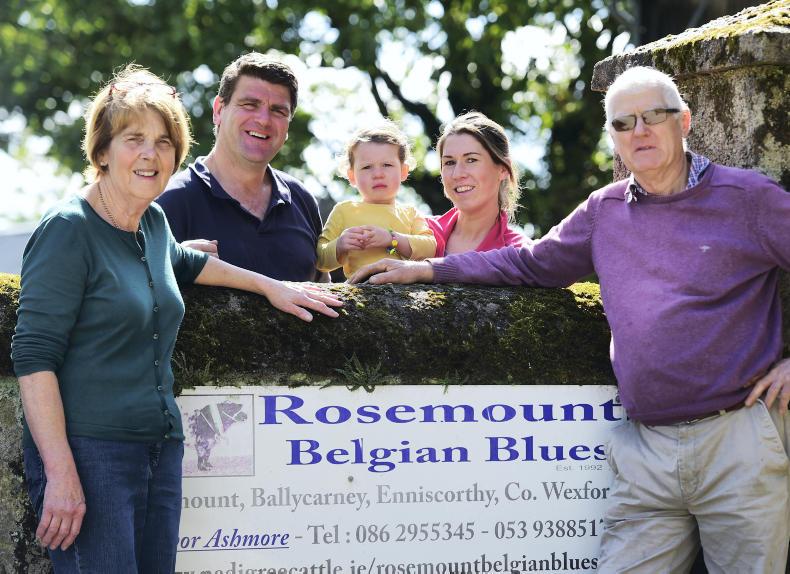
Joyce, Trevor, Anna, Caroline and Niall Ashmore. \ Alfie Shaw
“Atlanta bred Rosemount Ulla and she was a serious brood cow for us and a lot of the lines stem from there and a lot of the bulls that went to AI stem from there.”
Sire selection was critical, particularly in the Belgian Blue breed, while natural service would be quite low in pedigree herds.
“Initially we would have been going to Belgium two or three times a year. I’m all about the visual. I’ve built up knowledge through the years of breeding and I feel I’m only really getting somewhere now. It takes years to build up knowledge about a breed, but definitely Belgium every autumn without fail.
“I would’ve went out to the AI centres over there from which I knew I could filter semen back through the likes of Dovea and Progressive. They were very good to us.
"We would have went out to the different AI stations and saw progeny more so than the bulls for me. We learned that through the years not to get carried away with the bull, more focus on the breeding.
“Selection would have been through that means and I was big on correctness of cattle, length and height and what works in Belgium would not necessarily work on farm here. You know, horses for courses.
“I recognised that a long time ago and to breed that correct, stylish long animal is what I was chasing and I think it filtered through to my females.”
Through the years, the herd has had a clear focus on what they want out of their animals: “I felt we have to have a balance. You had to have enough height and length in a bull and one that would last.
"When judging my own stock, I start from the ground up. If it’s not correct on four good pins, I don’t care how good the body is. We would have been very harsh and culled hard throughout the years.
“Of course, you build up knowledge of stock and knowledge of breeding and try to combine both.”
Past success
Speaking about past bulls which left their mark on the herd, Trevor thinks one bull in particular changed the breed.
“I think the likes of Dafydd transformed the breed. In later years Empire from a breeding point of view left great cows.
“Young heifers in the sale are off Kubitus through Progressive Genetics and there’s a Mannequin in it – he seems to be breeding well.”
In the short time the herd has been running, it has had some very high moments, using shows and sales as a shop window.
“We brought home the spring show in Goffs when I was younger. We had good bulls at Tully and would have won numerous all-Ireland championships.
“We got three years in a row for the junior bull when we went back showing in the years 2011, 2012 and 2013. That was special.
“Biggest standout moments for me I suppose would be selling bulls to AI. I get great pleasure in that because with the likes of Rosemount Cash, there are 4,500 or 5,000 calves off him. The feedback is good. It gives you great satisfaction.”
Sales within the herd were far from restricted to Ireland. While the herd would have sold a number of top breeding females to breeders in Ireland, it also sold across the water and even back to the breed’s home in Belgium.
“We were lucky enough to get bulls to AI too over the last number of years. Rosemount Cash would have been one of the first bulls. Progressive bought three, Bova bought one, a Belgian AI centre bought one and Genus bought four, so there would have been about nine in the last number of years.
“I would say UK sales were helped a lot by bulls in AI, but also building your name, keeping your name and the type of stock I was breeding would blend into their breeding policy too.”
A big part of these sales, alongside the quality of animal and breeding, is the herd’s high health status.
“It has been nearly 30 years since there has been TB on the farm. We’ve been testing and vaccinating for BVD since the word go and we’ve never had a BVD case.
“All cattle bought into the herd, such as recipients, have been tested for IBR and all female animals clear. We also vaccinate for salmonella and Lepto.”
Future outlook
“The breed has been under pressure ... but I do see a turn in it. The phone is back ringing again for bulls.
"Mart prices are up. I see a future for the breed, especially on the dairy cow. There’s a great core of breeders over here. There’s knowledge and they’re breeding very good cattle.”
The sale will take place at 2.30pm at Carnew Mart 18 October.
Read more
Sommet de l’Elevage – the French way
First production sale for Portauns and Lisduff
Based in Enniscorthy, Co Wexford, Trevor Ashmore’s Belgian Blue herd has made a name for itself over the last number of years.
The relatively young herd has made it to the top table in pedigree breeding, selling nine bulls to AI services in Ireland and abroad.
However, after 25 years, the herd will disperse on Wednesday 18 October at Carnew Mart.
Trevor said: “We were always malting barley here alongside the Blues, but the cereal market has been quite depressed and with the three-crop rule, we had to pull in other grains.
“We’re growing wheat, oats and maize now and selling the cereals off the field green.
"The sector’s been quite depressed of late and we can grow the grain and straw, which means we can grow the feed ourselves. Basically, I’m trying to add value to it so we’re going to try fattening cattle off it.”
Of course, you build up knowledge of stock and knowledge of breeding and try to combine both
This change of enterprise means some of the better-known lines which have produced numerous champions and AI bulls will be offered at the sale.
Trevor explains how the herd was started: “I started back in 1992 with the help of my parents, Niall and Joyce.
Originally, female lines would have come from Ireland, but we went to Belgium in 1999 and imported basically my two brood cows really. Most of the herd would have stemmed from that.
“They were called Atlanta and Jocvel.
"We slowly grew it within ourselves, then didn’t buy in that much. They became our two breeding cows. We flushed them and they were two serious breeding cows and those lines filtered through to the sale animals also.

Joyce, Trevor, Anna, Caroline and Niall Ashmore. \ Alfie Shaw
“Atlanta bred Rosemount Ulla and she was a serious brood cow for us and a lot of the lines stem from there and a lot of the bulls that went to AI stem from there.”
Sire selection was critical, particularly in the Belgian Blue breed, while natural service would be quite low in pedigree herds.
“Initially we would have been going to Belgium two or three times a year. I’m all about the visual. I’ve built up knowledge through the years of breeding and I feel I’m only really getting somewhere now. It takes years to build up knowledge about a breed, but definitely Belgium every autumn without fail.
“I would’ve went out to the AI centres over there from which I knew I could filter semen back through the likes of Dovea and Progressive. They were very good to us.
"We would have went out to the different AI stations and saw progeny more so than the bulls for me. We learned that through the years not to get carried away with the bull, more focus on the breeding.
“Selection would have been through that means and I was big on correctness of cattle, length and height and what works in Belgium would not necessarily work on farm here. You know, horses for courses.
“I recognised that a long time ago and to breed that correct, stylish long animal is what I was chasing and I think it filtered through to my females.”
Through the years, the herd has had a clear focus on what they want out of their animals: “I felt we have to have a balance. You had to have enough height and length in a bull and one that would last.
"When judging my own stock, I start from the ground up. If it’s not correct on four good pins, I don’t care how good the body is. We would have been very harsh and culled hard throughout the years.
“Of course, you build up knowledge of stock and knowledge of breeding and try to combine both.”
Past success
Speaking about past bulls which left their mark on the herd, Trevor thinks one bull in particular changed the breed.
“I think the likes of Dafydd transformed the breed. In later years Empire from a breeding point of view left great cows.
“Young heifers in the sale are off Kubitus through Progressive Genetics and there’s a Mannequin in it – he seems to be breeding well.”
In the short time the herd has been running, it has had some very high moments, using shows and sales as a shop window.
“We brought home the spring show in Goffs when I was younger. We had good bulls at Tully and would have won numerous all-Ireland championships.
“We got three years in a row for the junior bull when we went back showing in the years 2011, 2012 and 2013. That was special.
“Biggest standout moments for me I suppose would be selling bulls to AI. I get great pleasure in that because with the likes of Rosemount Cash, there are 4,500 or 5,000 calves off him. The feedback is good. It gives you great satisfaction.”
Sales within the herd were far from restricted to Ireland. While the herd would have sold a number of top breeding females to breeders in Ireland, it also sold across the water and even back to the breed’s home in Belgium.
“We were lucky enough to get bulls to AI too over the last number of years. Rosemount Cash would have been one of the first bulls. Progressive bought three, Bova bought one, a Belgian AI centre bought one and Genus bought four, so there would have been about nine in the last number of years.
“I would say UK sales were helped a lot by bulls in AI, but also building your name, keeping your name and the type of stock I was breeding would blend into their breeding policy too.”
A big part of these sales, alongside the quality of animal and breeding, is the herd’s high health status.
“It has been nearly 30 years since there has been TB on the farm. We’ve been testing and vaccinating for BVD since the word go and we’ve never had a BVD case.
“All cattle bought into the herd, such as recipients, have been tested for IBR and all female animals clear. We also vaccinate for salmonella and Lepto.”
Future outlook
“The breed has been under pressure ... but I do see a turn in it. The phone is back ringing again for bulls.
"Mart prices are up. I see a future for the breed, especially on the dairy cow. There’s a great core of breeders over here. There’s knowledge and they’re breeding very good cattle.”
The sale will take place at 2.30pm at Carnew Mart 18 October.
Read more
Sommet de l’Elevage – the French way
First production sale for Portauns and Lisduff







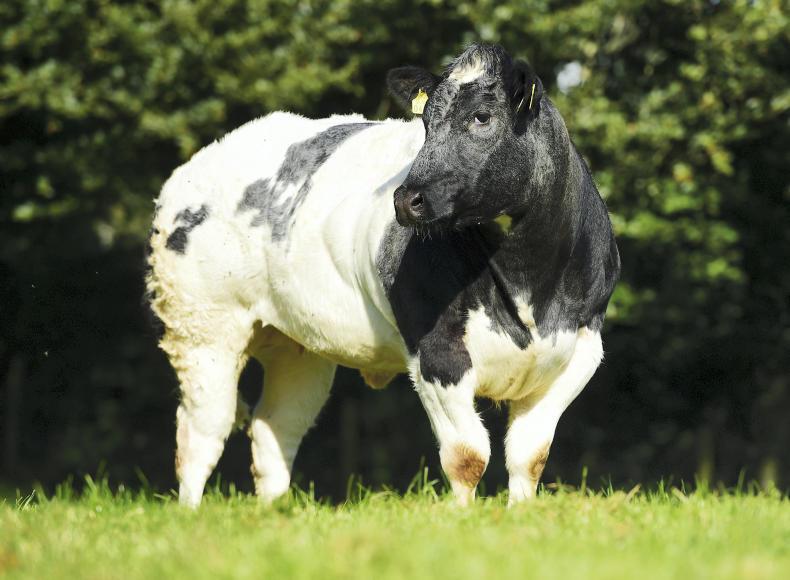
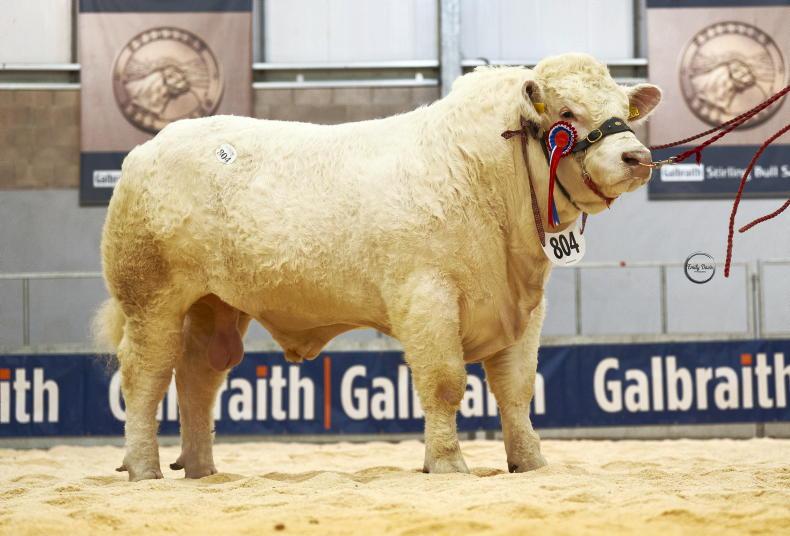
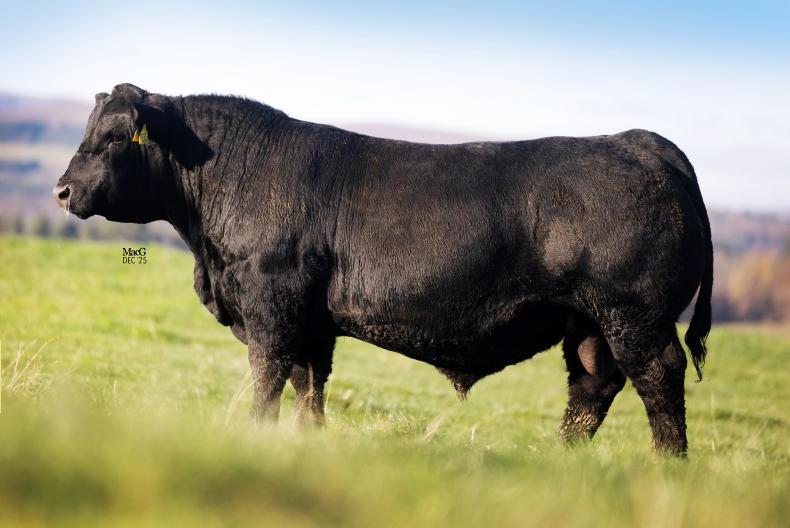
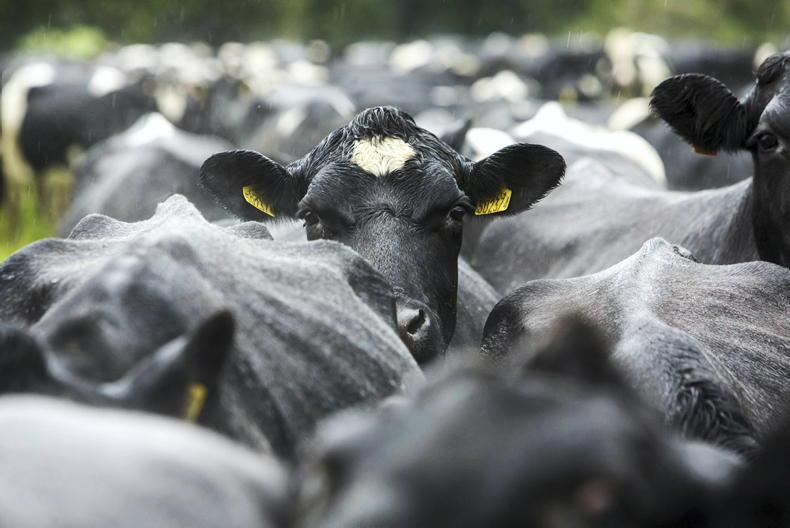
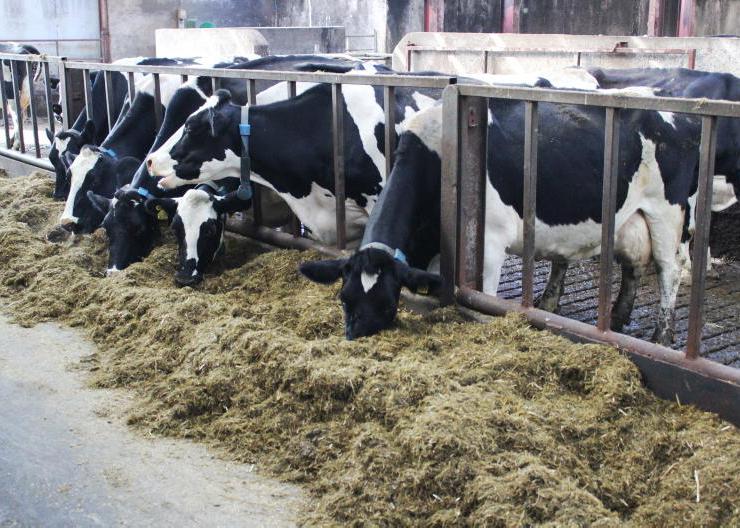
SHARING OPTIONS